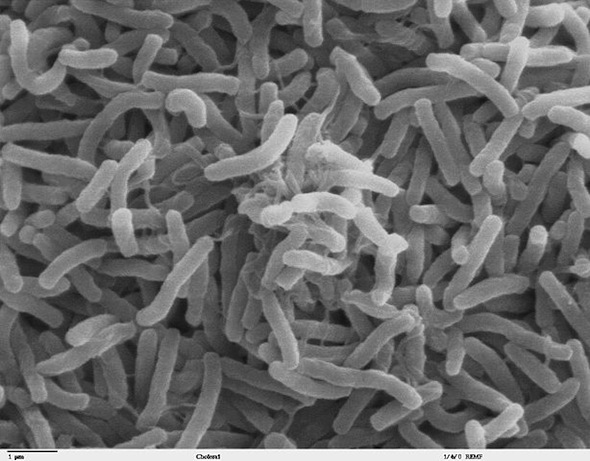There is a new treatment modality on the horizon that is gaining momentum in the medical community. It is Fecal Microbiota Transplantation (FMT). This is a procedure where donor feces are transplanted into the colon of a person suffering from a bacterial infection. While using poop may be off putting, it works and has been used to CURE infections from the dangerous Clostridium difficile bacteria.
Clostridium Difficile
These infections can be recurring and deadly. In a letter to the editor of the New York Times, Christian John Lillis, executive director of the Peggy Lillis Memorial Foundation, an advocacy group devoted to preventing C. difficile infections wrote,
Estimates from the Department of Health and Human Services indicate that yearly deaths from the disease exceed 28,000… rivaling the number of Americans killed every year by guns and traffic accidents.
Clostridium difficile is rampant in nursing homes, rehab centers and hospitals. In the United States, more than 300,000 patients in hospitals contract C. difficile each year, and researchers estimate that the total number of cases, in and out of hospitals, may be three million. I personally know of three elderly people who died of C. diff. infections, which they caught while in the hospital or as a result of taking antibiotics. In recent years there have been several virulent strains appearing.
This study published in the New England Journal of Medicine, January 2013, found that 15 out of 16 people who were suffering from recurring C. diff infections were cured after FMT. They compared this group with two other groups of patients who were given antibiotics. The antibiotics cured 3 out of 13 in one groups and 4 out of 13 in the other group. The study was stopped after an interim analysis. Clearly the FMT group was benefiting from the treatment.
The researchers concluded that,
The infusion of donor feces was significantly more effective for the treatment of recurrent C. difficile infection than the use of vancomycin.
History of Success
Back in 1958, doctors in Denver administered feces by enema to patients with fulminant, life-threatening pseudomembranous enterocolitis. The goal of this infusion of donor feces was to “re-establish the balance of nature” within the intestinal flora to correct the disruption caused by antibiotic treatment. They reported “immediate and dramatic” responses and concluded that “this simple yet rational therapeutic method should be given more extensive clinical evaluation.” Sadly, it did not take hold at the time.
Antibiotics — the Cause and the Cure
Since then, a clear association between C. difficile infection and pseudomembranous enterocolitis has been established — as well as the association of C. diff and the use of antibiotics. The main treatment modality has been antibiotics — both the cause and the cure — or the attempt at a cure.
C. difficile has become the most common cause of nosocomial (acquired or occurring in a hospital) infectious diarrhea in the United States. During the past decade, there has been an alarming increase in the incidence and severity of this disorder, with associated increases in cost, suffering and death.
Sadly, many people with C. diff infections suffer through round after round of antibiotic treatment only to have a recurrence of the problem time after time.
Fecal Transplants are Effective
This new research is the first to provide the solid scientific evidence that medicine requires. Even the Food and Drug Administration had taken notice. They have recently begun to regard stool used for transplant as a drug, and to require doctors administering it to apply for permission — something that could hinder treatment (no surprise there).
Next thing you know some pharmaceutical company will start to manufacture fake poop and charge exorbitant fees for it… Fortunately poop cannot be patented — but there are probably some companies rushing to figure out which bacteria are the “good” ones in order to find a way to patent something to make oodles of money. As it is, if this becomes the standard of care for serious intestinal diseases like Crohn’s or colitis, pharmaceutical companies stand to lose hundreds of thousands of dollars from the dangerous and toxic medicines they push for these diseases.
For those who have received a fecal transplant after suffering from recurring bouts of C. diff. — they report that the next day they were 100% cured. I’d say that’s a pretty powerful treatment modality.
The Procedure is Simple
Simply put, stool is placed in a blender with saline (salt water), and poured into a syringe. The sick patient is then given the freshly homogenised human stool via a colonoscopy, which is done through the rectum.
The donors theoretically come from a select group of Super Donors – people who did not have antibiotics as children, who are healthy, and who will be able to donate their stool. I bet there are some Real Foodies out there that would qualify.
Fecal Transplantation in Australia
There has been much discussion on the web about the use of fecal transplants for other bowel disorders such as ulcerative colitis and Crohn’s disease as well as metabolic issues, obesity, type 2 diabetes, and neurological conditions including multiple sclerosis and Parkinsons.
Fecal Tranplants are being used very successfully by Professor Thomas Borody, at the Centre for Digestive Diseases in Five Dock, Sydney. He uses them to treat gut bacterial conditions such as colitis, Irritable Bowel Syndrome as well as Clostridium difficile.
Dr. Barody predicts that there will be Stool Banks in hospitals much like Blood Banks and Sperm Banks. According to Dr. Barody,
It’s only a matter of time before donors are more common. And soon, we hope that all hospitals will have filtered, frozen stool which will be able to be used in emergencies… Contrary to popular belief, stool has no waste in it – it’s a mass of good bacteria… the incoming bacteria are capable of killing bad bacteria and recolonizing your gut, restoring your body’s balance and leading to a resolution of your symptoms.
I can get behind this procedure. We know how important gut bacteria is to our health. It makes a lot of sense to use good poop to cure what conventional medicine can’t.
Would you use this procedure if you had a digestive disease? Leave a comment and let me know!
For more information about this topic:
Thepowerofpoo.com
Fecal Biotherapy












